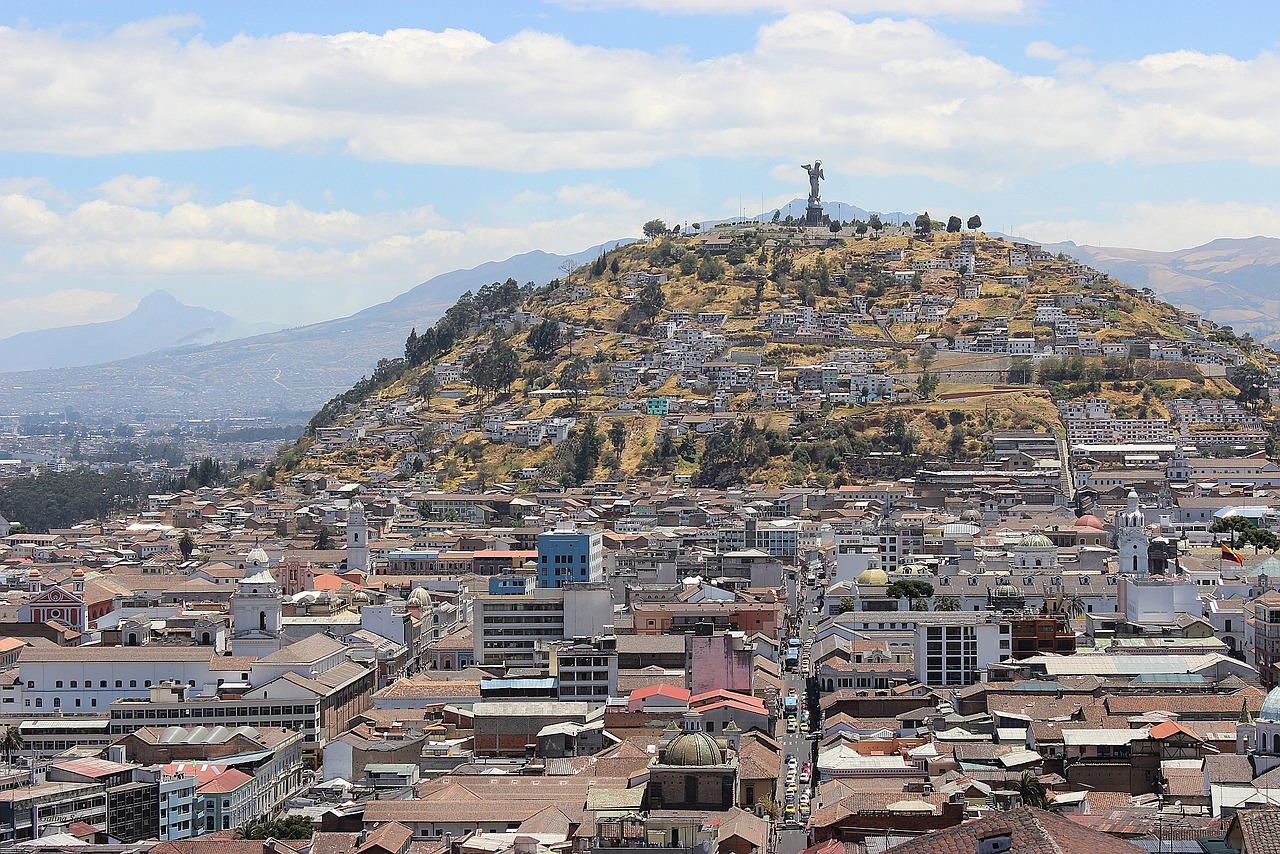
A view of Quito, Ecuador
The Hague: Mexico today filed an Application instituting proceedings against Ecuador before the International Court of Justice (ICJ) concerning a dispute relating to “legal questions concerning the settlement of international disputes by peaceful means and diplomatic relations, and the inviolability of a diplomatic mission”.

Mexico’s President López Obrador explained that the lawsuit filed before the ICJ requests the suspension of Ecuador within the UN “as long as there is no public apology, commitment of non-repetition and reparation of damages. The aim is to set a precedent to avoid authoritarian acts”.
Mexico’s Foreign Secretary Alicia Bárcena said that Mexico, on the instruction of President López Obrador, will hold Ecuador accountable for its “flagrant violation of the inviolability of our embassy in Quito and for the physical attacks committed against our diplomatic personnel. These are clear violations of the Vienna Convention. This violent aggression is what we are taking to the International Court of Justice.”
In its application to the Court, Mexico stated that, on April 5, 2024, “[a]round 15 special operations agents” from Ecuador entered the Mexican Embassy in Quito “by forcible means and without authorization”. It further states that, during the incident, the Deputy Chief of Mission, Roberto Canseco Martínez, was “violently assaulted” and that “[t]he agents then took Jorge David Glas Espinel …, former Vice-president of the Republic of Ecuador, placing him inside one of the vehicles and leaving the premises”.
Mexico contended that the incident of April 5 is not isolated but follows “a series of continued acts of intimidation and harassment”, prompted by the arrival of Glas at the Mexican Embassy on December 17, 2023, and his subsequent request for asylum, which was formally filed on December 20, 2023, and later granted. The Appellant further claimed that “Ecuador has violated Mexico’s rights under customary and conventional international law, as well as fundamental principles upon which the international legal system is based”. It referred to the Court’s jurisdiction on Article 36, paragraphs 1 and 2, of the Statute of the Court and Article XXXI of the Pact of Bogotá, to which both States were parties. In light of the violations it alleged, Mexico requested the Court to award remedies including full reparation and “[t]o suspend Ecuador as a member of the United Nations”.
Mexico’s application also contained a request for the indication of provisional measures submitted under Article 41, paragraph 1, of the Statute of the Court. Mexico requested the Court, pending a final judgment in the case, to indicate the following provisional measures:
“a) That the Government of Ecuador takes appropriate and immediate steps to provide full protection and security of diplomatic premises, their property, and archives, preventing any form of intrusion against them.
b) That the Government of Ecuador allows the Mexican Government to clear diplomatic premises and the private residence of diplomatic agents.
c) That the Government of Ecuador ensures that no action is taken which might prejudice the rights of Mexico in respect of any decision which the Court may render on the merits.
d) That the Government of Ecuador refrains from any act or conduct likely to aggravate or widen the dispute of which the Court is sei[s]ed.”
Under Article 74 of the Rules of Court, “[a] request for the indication of provisional measures shall have priority over all other cases”.
On April 10, 2024, the Permanent Council of the Organization of American States (OAS), which brings together all 35 independent states, of the Americas approved a resolution, ‘The Intrusion of the Ecuadorian Police into the Embassy of Mexico in Violation of the Vienna Convention on Diplomatic Relations, and the Institution of Diplomatic Asylum’, with 29 in favour, 1 against, 1 abstention and 2 absent. The US asked both countries to resolve their differences cooperatively.
Earlier, even as the United States of America on the very next day after the embassy attack issued a statement condemning “any violation of the Vienna Convention on Diplomatic Relations”, Washington stated on April 8 that it was still trying to find out “whether it was a consular facility or not”.
Both Mexico and Ecuador are crucial partners of the United States, and Washington said it placed a high value on our relations with both countries. “We encourage the two countries to resolve their differences in accordance with international norms,” the US State Department Spokesperson Matthew Miller, said. “We have asked Ecuador to work with Mexico to find a resolution to this dispute,” he disclosed.
Already Israel claimed it wasn’t “a legitimate diplomatic facility”.
Meanwhile, South Africa, which is a petitioner in a case of genocide by Israel in Gaza in ICJ, today described the reported attack perpetrated by the Ecuadorian police on the Mexican Embassy in Quito as a violation of the Vienna Convention on Diplomatic Relations of 1961, in particular the principle of inviolability of diplomatic premises and personnel. It expressed concern over the “arbitrary arrest” of former Vice President, Jorge Glas Espinel, who was granted political asylum by the Mexican Government following his application to be protected from persecution.
South Africa called for an amicable diplomatic solution to be reached between the Mexican and Ecuadorian Governments, in finding a lasting solution for these countries, per the Vienna Convention on Diplomatic Relations.
Pretorio asked regional organisations in the Americas region and the UN to be seized with “this urgent matter, which has the potential to negatively affect the region and the rule of international law in the conduct of diplomatic relations”.
On April 10, 2024, Mexico’s government released a new video of the moment Ecuadorian police stormed its embassy in Quito and arrested Ecuador’s former vice president who was sheltering there after a criminal conviction.
South Africa called for an amicable diplomatic solution to be reached between the Mexican and Ecuadorian Governments, in finding a lasting solution for these sisterly countries of the Global South, in accordance with the Vienna Convention on Diplomatic Relations.
Further, South Africa trusts that regional organisations in the Americas region and the UN will be seized with this urgent matter, which has the potential to negatively affect the region and the rule of international law in the conduct of diplomatic relations.
– global bihari bureau





